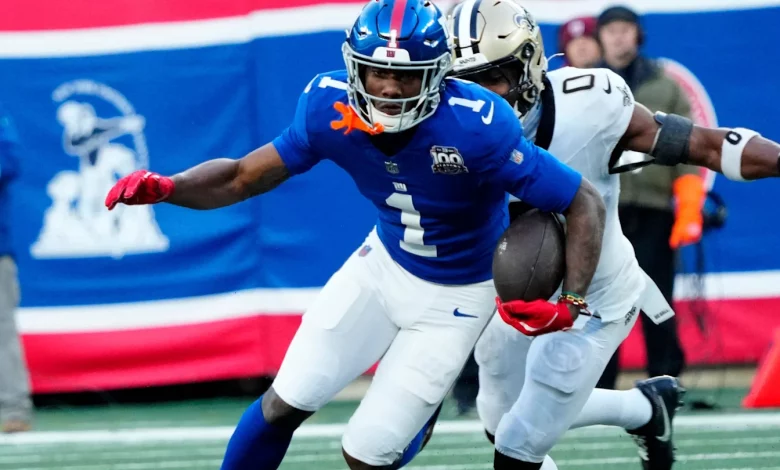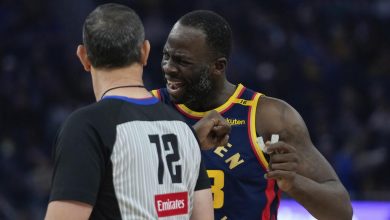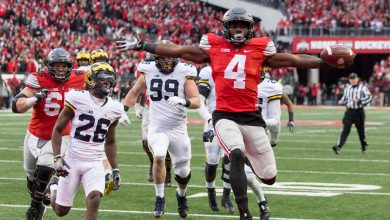What Role Should Travis Hunter of Colorado Play in the NFL, According to Malik Nabers?

Travis Hunter, the highly touted cornerback and wide receiver from Colorado, has become one of the most exciting and versatile prospects in college football. His dual-threat ability to impact games on both sides of the ball has garnered him attention from fans, coaches, and scouts alike. Hunter’s college career has been nothing short of impressive, with many viewing him as a future star in the NFL. As the discussion around his potential NFL role continues to build, one interesting perspective has come from Malik Nabers, a standout wide receiver at LSU, who recently weighed in on what role Hunter should play in the NFL.
Malik Nabers is no stranger to the spotlight himself. As one of the most dynamic wide receivers in college football, Nabers has built a reputation for his ability to make plays in critical moments and dominate on the field. His opinion on Hunter’s future role carries weight due to his own expertise and experience in the game. In this article, we will explore Nabers’ thoughts on Travis Hunter’s potential role in the NFL, diving into what makes Hunter such a special talent, and analyzing the various possibilities for his future in professional football.
Travis Hunter: A Dual-Threat Talent
Travis Hunter’s journey to college football stardom is a tale of versatility and athleticism. Hunter initially made waves as one of the top high school recruits in the country, earning a reputation as a cornerback with elite coverage skills and the ability to shut down opposing wide receivers. However, what set Hunter apart from most other defensive backs was his offensive capabilities. In addition to being a lockdown corner, he was also an exceptional wide receiver, capable of making acrobatic catches and turning short passes into long touchdowns. His unique ability to excel at both positions made him a standout recruit and a rare two-way player, a trait that is becoming increasingly uncommon in modern football.
When Hunter decided to commit to Deion Sanders at Colorado, it marked the beginning of what many expected to be a transformational journey for both the player and the program. Under Coach Sanders, Hunter’s role expanded to include playing both ways, showcasing his skills as a cornerback and a wide receiver in multiple games. His performances in both areas have been jaw-dropping, and his ability to switch between the two positions seamlessly has solidified his reputation as one of the most intriguing prospects in college football.
While his college career is still unfolding, Hunter’s combination of size, speed, agility, and football IQ has made him a household name. Standing at 6’1″ and weighing around 165 pounds, Hunter has the ideal physical tools to excel at both cornerback and wide receiver at the next level. His top-end speed, combined with his ability to track the ball and make plays in the air, has led many to speculate about where he might fit best in the NFL.
Malik Nabers’ Perspective on Hunter’s NFL Role
As an accomplished wide receiver at LSU, Malik Nabers has had his share of battles with elite defensive backs. When it comes to discussing Travis Hunter’s potential role in the NFL, Nabers’ insight carries significant weight. Nabers, who has faced some of the best cornerbacks in college football, understands what it takes to succeed at the highest level of the sport. His perspective on Hunter’s future is both informed and nuanced.
Nabers recently commented on the potential roles that Hunter could play in the NFL, highlighting the fact that Hunter’s versatility gives him the opportunity to succeed in multiple positions. “Travis has everything you want in a cornerback or a wide receiver,” Nabers said in an interview. “His size, speed, and ability to make plays on the ball are second to none. But what makes him special is that he’s not just a one-dimensional player. He can dominate on both sides of the ball, and that’s what makes him so dangerous.”
Nabers’ statement underscores the very essence of Travis Hunter’s appeal: his ability to contribute on both offense and defense. While Nabers acknowledges Hunter’s impressive skills at cornerback, he also highlights the importance of Hunter’s wide receiver abilities. “You don’t see many players who can flip the switch and play both ways at that level,” Nabers added. “His ability to track the ball and go up and get it as a receiver is incredible. At the next level, I think you could see him being used in both ways, and that makes him an extremely valuable asset.”
Travis Hunter as a Cornerback
The more traditional route for Travis Hunter would be to pursue a career as a cornerback in the NFL. As a shutdown corner, Hunter has all the tools to excel at the professional level. His ability to cover wide receivers in man-to-man and zone coverage has been on full display at Colorado. His agility, quickness, and ball-hawking skills make him a nightmare for quarterbacks looking to test him in coverage.
As a cornerback, Hunter’s greatest strength lies in his ability to read the quarterback’s eyes and anticipate passes. His fast-twitch reactions allow him to jump routes and make plays on the ball, as he has already done throughout his college career. His ability to stay glued to wide receivers, despite their best efforts to shake him off, is a testament to his exceptional footwork and awareness on the field.
What makes Hunter particularly enticing as a cornerback in the NFL is his versatility. At the professional level, cornerbacks are often asked to cover a wide range of receivers, from speedy slot players to towering outside threats. Hunter’s size and athleticism give him the flexibility to handle any matchup, making him a potential matchup nightmare for offenses. Whether he’s tasked with shutting down a quick, elusive slot receiver or a big, physical wideout, Hunter has the tools to be successful at any cornerback position.
Travis Hunter as a Wide Receiver
While cornerback may be the most conventional path for a player with Hunter’s skill set, his ability as a wide receiver should not be underestimated. As a dual-threat player, Hunter has demonstrated exceptional catching ability and route running, showcasing his potential to be a difference-maker on offense.
One of the key aspects of Hunter’s success as a wide receiver is his ability to track the football and make contested catches in difficult situations. His vertical leap and hand-eye coordination allow him to make acrobatic catches, often coming down with the ball in tight coverage. His route running has also improved over the course of his college career, as he becomes more polished and refined in his technique. Whether it’s on a go route, a crossing route, or a quick slant, Hunter’s ability to change direction and accelerate makes him a serious threat as a pass catcher.
From an NFL perspective, having a player who can seamlessly transition between cornerback and wide receiver provides immense value. A team could use Hunter as a versatile weapon, playing him at wide receiver on offense and then switching him to cornerback when the defense needs a boost. This type of flexibility makes Hunter an extremely valuable commodity, and it is something that will undoubtedly catch the eye of NFL scouts.
What Role Would Be Best for Hunter in the NFL?
When it comes to which role would be best for Travis Hunter in the NFL, Malik Nabers emphasized that the future of football may allow for more players to take on hybrid roles like Hunter. “The NFL is changing,” Nabers said. “Teams are looking for guys who can do it all. If you can be a dynamic player on offense and defense, you can create mismatches everywhere. I think that’s where Travis can really shine.”
Given the direction of the NFL, which increasingly values flexibility and versatility, it’s possible that Hunter could follow a hybrid path in the professional ranks. While he may ultimately settle into one position, his ability to contribute on both sides of the ball would make him a unique weapon for any team. A team might opt to use him primarily as a cornerback, allowing him to showcase his skills in coverage, but they could also use him as a wide receiver in certain packages to exploit mismatches. The NFL’s growing emphasis on specialized roles, where players are asked to do more than one thing, would benefit someone like Hunter, who excels in multiple facets of the game.









